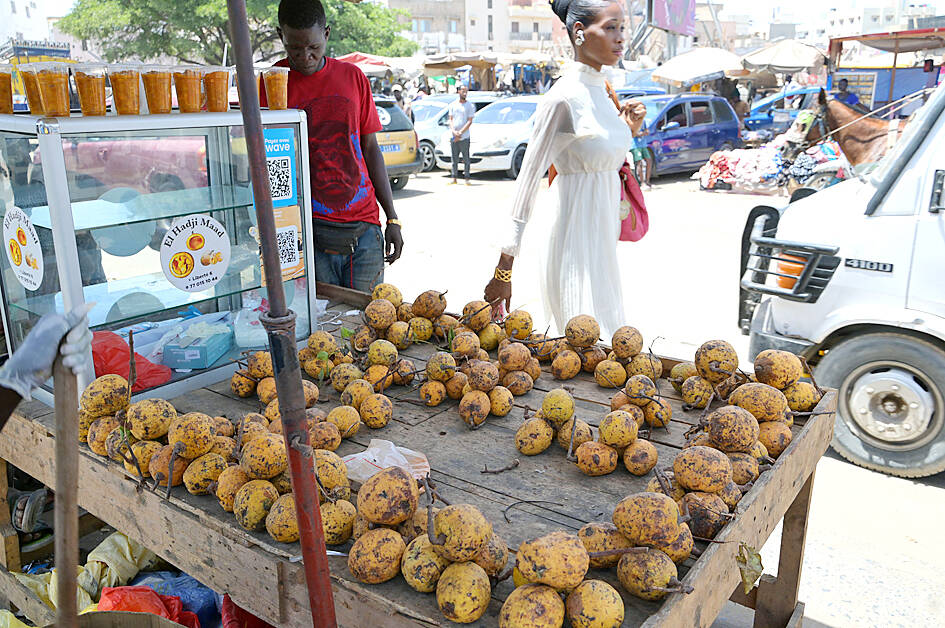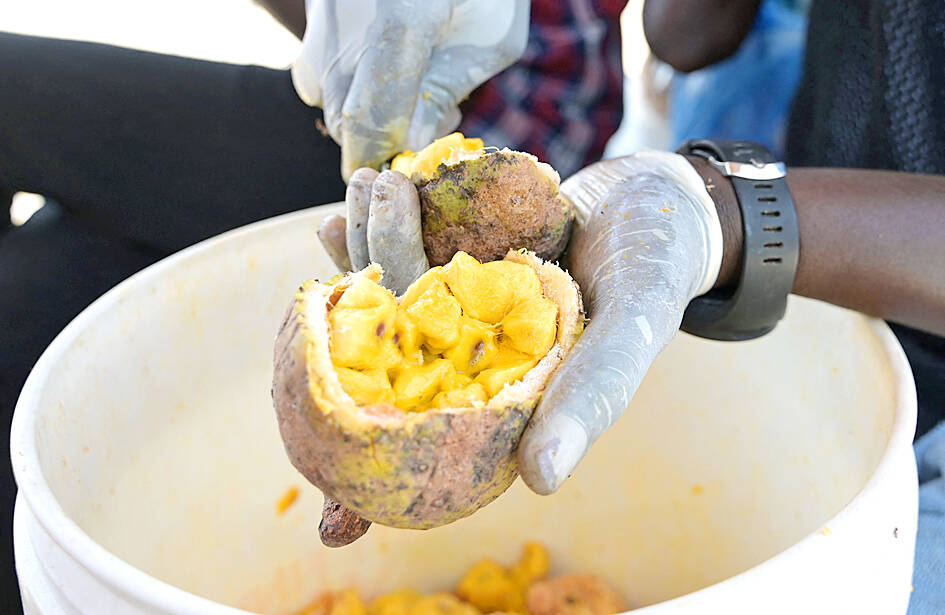Outside a bustling fruit market in Senegal’s Dakar region, three trucks blocked the road while a dozen men sweated to unload a precious cargo.
Working in intense heat and racing against the clock, they were shifting 60 tonnes of maad — a delicate tropical fruit that is massively popular in the West African state.
A yellow fruit with a pulp that has a distinctive sweet and sour flavor and is rich in vitamins and fiber, maad comes from a vine called Saba senegalensis, which grows wild and is common across the region.

Photo: AFP
The fruit’s season is relatively short, running from May to August, which prompts a rush of sellers at street corners, hawking the delicacy with salt, sugar or chilli, blended into juice or turned into jam.
Maad has different names across West Africa, where it is eaten from the Ivory Coast to Mali and Guinea — but it is most popular in Senegal.
Countless jobs depend on the fruit, from harvesting and distribution to selling and processing.

Photo: AFP
At the Sandika market in Pikine, workers labored to empty the trucks that had just arrived, sorting the maad according to ripeness.
“The unloading will be finished by the end of the day,” said Dame Sarr, a 28-year-old wholesaler, who with his uncle had invested 6 million CFA francs (US$10.020) in the consignment.
They expected to clear the equivalent of at least US$1,000 in profit — if the fruit was sold fast.
“If I don’t shift the goods, I will have to cut the price tomorrow, because with every passing day maad loses its quality,” he said, sitting under a parasol.
The good news was that several customers were already hovering around.
Sarr had separated out the finest fruit to sell for 4,200 CFA francs for a bucket of 40 pieces. The others were on sale for half that price. A 20kg box of maad cost between 20,000 CFA francs and 25,000 CFA francs.
“Maad is a very risky investment. It can’t stand sunlight or rain, and transporting it is difficult,” market representative and salesman Djiby Sandika said.
The fruit “best suits small-scale retailers, who make large profits,” Sarr said.
In Senegal most maad grows in the southern Casamance region on vines that wrap themselves around trees in thickly forested areas.
Picking the fruit is done by hand and involves using long sticks — a task that involves the added risk of snakes.
The Economy, Territory, Development and Service (ETDS) non-governmental organization said that nearly 1,500 tonnes of maad are harvested annually in the Ziguinchor, Kedougou and Kolda areas.
Mariama Dieme, who heads a project to market maad production in Casamance, said that with better access, output could be trebled.
The fruit is already under threat from “over-exploitation,” from fires used to burn stubble from fields and from damage caused by forest hunters, Dieme said.
The ETDS is fostering a program for small-scale woman-led producers to make maad jam, juice or syrup, and even export some of their production.
Maad jam sold in France via sellers on Instagram costs 25 euros (US$27.38) for a 300g jar, said Fatou Binetou Adour, a Senegalese who lives in Paris.

Kehinde Sanni spends his days smoothing out dents and repainting scratched bumpers in a modest autobody shop in Lagos. He has never left Nigeria, yet he speaks glowingly of Burkina Faso military leader Ibrahim Traore. “Nigeria needs someone like Ibrahim Traore of Burkina Faso. He is doing well for his country,” Sanni said. His admiration is shaped by a steady stream of viral videos, memes and social media posts — many misleading or outright false — portraying Traore as a fearless reformer who defied Western powers and reclaimed his country’s dignity. The Burkinabe strongman swept into power following a coup in September 2022

‘FRAGMENTING’: British politics have for a long time been dominated by the Labor Party and the Tories, but polls suggest that Reform now poses a significant challenge Hard-right upstarts Reform UK snatched a parliamentary seat from British Prime Minister Keir Starmer’s Labor Party yesterday in local elections that dealt a blow to the UK’s two establishment parties. Reform, led by anti-immigrant firebrand Nigel Farage, won the by-election in Runcorn and Helsby in northwest England by just six votes, as it picked up gains in other localities, including one mayoralty. The group’s strong showing continues momentum it built up at last year’s general election and appears to confirm a trend that the UK is entering an era of multi-party politics. “For the movement, for the party it’s a very, very big

ENTERTAINMENT: Rio officials have a history of organizing massive concerts on Copacabana Beach, with Madonna’s show drawing about 1.6 million fans last year Lady Gaga on Saturday night gave a free concert in front of 2 million fans who poured onto Copacabana Beach in Rio de Janeiro for the biggest show of her career. “Tonight, we’re making history... Thank you for making history with me,” Lady Gaga told a screaming crowd. The Mother Monster, as she is known, started the show at about 10:10pm local time with her 2011 song Bloody Mary. Cries of joy rose from the tightly packed fans who sang and danced shoulder-to-shoulder on the vast stretch of sand. Concert organizers said 2.1 million people attended the show. Lady Gaga

SUPPORT: The Australian prime minister promised to back Kyiv against Russia’s invasion, saying: ‘That’s my government’s position. It was yesterday. It still is’ Left-leaning Australian Prime Minister Anthony Albanese yesterday basked in his landslide election win, promising a “disciplined, orderly” government to confront cost-of-living pain and tariff turmoil. People clapped as the 62-year-old and his fiancee, Jodie Haydon, who visited his old inner Sydney haunt, Cafe Italia, surrounded by a crowd of jostling photographers and journalists. Albanese’s Labor Party is on course to win at least 83 seats in the 150-member parliament, partial results showed. Opposition leader Peter Dutton’s conservative Liberal-National coalition had just 38 seats, and other parties 12. Another 17 seats were still in doubt. “We will be a disciplined, orderly